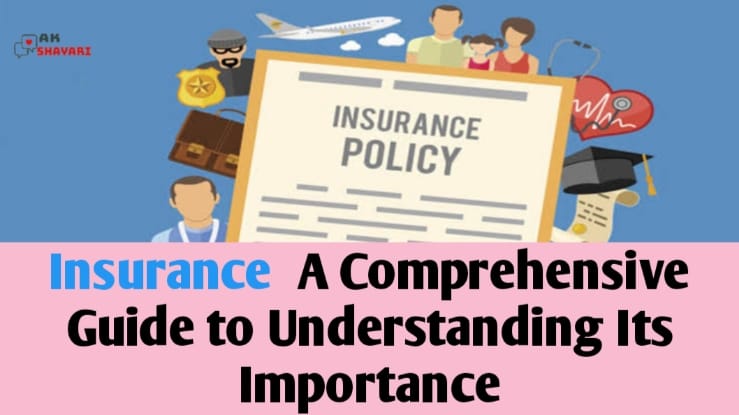Introduction
Insurance plays a vital role in modern society by providing financial protection against unforeseen events. From safeguarding our health and property to offering peace of mind in times of uncertainty, insurance is an indispensable part of personal and professional life. In this article, we’ll delve into the meaning, types, benefits, and challenges of insurance while offering tips on choosing the right policy.
Table of Contents
What is Insurance?
Insurance is a contract between an individual or entity and an insurance company, where the insurer agrees to compensate for specified losses in exchange for premium payments. It serves as a risk management tool, spreading financial risk among many people.
Key elements of insurance include:
- Policyholder: The individual or organization purchasing the insurance.
- Insurer: The company providing the coverage.
- Premium: The payment made by the policyholder to maintain the policy.
- Coverage: The extent of protection offered under the policy.
Types of Insurance
1. Health Insurance
Health insurance covers medical expenses incurred due to illnesses, injuries, or routine healthcare. Policies may include:
- Hospitalization benefits
- Coverage for prescription drugs
- Preventive care services
2. Life Insurance
Life insurance provides financial support to the beneficiaries of the insured in the event of death. Key variations include:
- Term Life Insurance: Coverage for a specific period.
- Whole Life Insurance: Permanent coverage with a savings component.
3. Auto Insurance
Mandatory in many regions, auto insurance protects against losses resulting from accidents, theft, or damage to vehicles. It often includes liability, collision, and comprehensive coverage.
4. Home Insurance
Homeowners insurance protects against damage to property and possessions due to events like fires, theft, or natural disasters. Renters can opt for renter’s insurance to cover their belongings.
5. Business Insurance
Business insurance shields organizations from financial risks, including liability claims, property damage, and employee-related risks. Specialized policies include professional indemnity and cyber liability insurance.
6. Travel Insurance
Travel insurance provides coverage for trip cancellations, medical emergencies abroad, and lost luggage.

Benefits of Insurance
- Financial Security
Insurance provides a safety net, ensuring that unexpected expenses don’t lead to financial instability. - Risk Mitigation
By transferring risks to insurers, individuals and businesses can focus on their goals without worrying about potential losses. - Peace of Mind
Knowing that you’re protected against unforeseen events offers emotional relief and reduces stress. - Legal Compliance
Certain types of insurance, such as auto and workers’ compensation, are legally required in many jurisdictions. - Support for Economic Growth
Insurance facilitates business operations by mitigating risks, allowing companies to invest and expand.
Challenges in the Insurance Industry
1. Rising Premium Costs
Healthcare and disaster insurance premiums have seen significant increases, making affordability a concern for many.
2. Complexity of Policies
Insurance jargon and intricate terms can make policies difficult to understand, leading to potential disputes.
3. Fraud
Insurance fraud, such as false claims, increases costs for insurers and, subsequently, for policyholders.
How to Choose the Right Insurance Policy
- Assess Your Needs
Determine what you need coverage for – health, assets, liability, etc. - Research Providers
Compare insurers based on reputation, customer service, and claim settlement ratios. - Understand the Policy
Carefully review the terms, including exclusions, limits, and deductibles. - Seek Expert Advice
Consulting an insurance advisor can help tailor a policy to your needs. - Review Periodically
Life circumstances change, and so should your insurance coverage.
Future Trends in Insurance
1. Technology Integration
The rise of insurtech is transforming the industry with innovations like AI-driven claims processing and personalized policies.
2. Focus on Sustainability
Green insurance products are gaining traction, promoting environmental conservation.
3. Pandemic Preparedness
The COVID-19 pandemic has led to increased interest in health and business interruption insurance.
FAQs on Insurance
- What is the primary purpose of insurance?
Insurance provides financial protection against losses due to unexpected events, reducing personal and organizational risks. - Is it mandatory to have insurance?
Certain types, like auto insurance, are legally required in most places, while others are optional but recommended. - How are insurance premiums calculated?
Premiums are determined based on factors such as age, risk level, coverage amount, and claim history. - What does an insurance deductible mean?
A deductible is the amount the policyholder must pay out of pocket before the insurer covers the remaining costs. - Can I have multiple insurance policies?
Yes, you can hold multiple policies, such as health, life, and auto insurance, to cover different aspects of your life. - What should I do if my insurance claim is denied?
If a claim is denied, review the policy terms, gather necessary documentation, and appeal the decision with your insurer.
Conclusion
Insurance is more than just a financial product; it’s a cornerstone of personal and economic stability. By understanding its nuances and staying informed about options, individuals and businesses can safeguard their future while contributing to a resilient economy.



